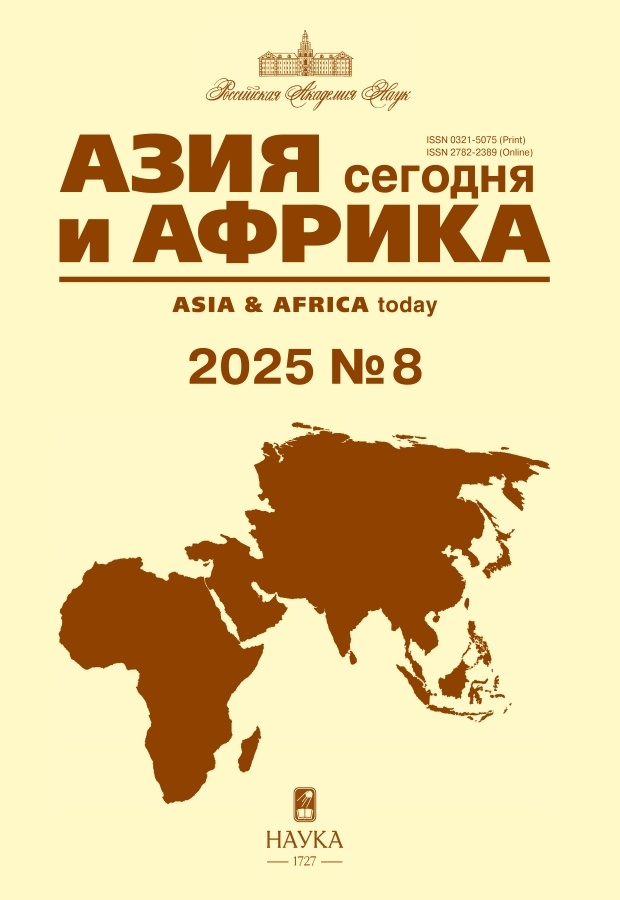Men’s and Women’s Roles in the Family and Society: Perceptions of Tanzanian Students
- Authors: Burkova V.N.1, Butovskaya M.L.2, Kavina A.3
-
Affiliations:
- Institute of Ethnology and Anthropology, Russian Academy of Sciences
- Russian State University for the Humanities
- St. John’s University
- Issue: No 8 (2025)
- Pages: 57-66
- Section: Field research
- URL: https://rjdentistry.com/0321-5075/article/view/690667
- DOI: https://doi.org/10.31857/S0321507525080077
- ID: 690667
Cite item
Abstract
Keywords
About the authors
Valentina N. Burkova
Institute of Ethnology and Anthropology, Russian Academy of Sciences
Email: burkovav@gmail.com
PhD (History), Senior Researcher, Center of Cross-Cultural Psychology and Human Ethology Moscow, Russia
Marina L. Butovskaya
Russian State University for the Humanities
Email: marina.butovskaya@gmail.com
Corresponding Member, Russian Academy of Sciences, Dr.Sc. (History), Professor, Leading Researcher, Institute of Social Anthropology Moscow, Russia
Alexander Kavina
St. John’s University
Email: akavina@sjut.ac.tz
PhD (History), Senior Lecturer, Department of History Dodoma, Tanzania
References
- Dancer H. 2018. Power and rights in the community: Paralegals as leaders in women’s legal empowerment in Tanzania. Feminist Legal Studies. Vol. 26. Pp. 47–64.
- Petts R.J., Shafer K.M., Essig L. 2018. Does Adherence to Masculine Norms Shape Fathering Behavior? Journal of marriage and family. Vol. 80. № 3. Pp. 704–720.
- Alsager A., McCann J.K., Bhojani A., Joachim D., Joseph J., Gibbs A., et al. 2024. “Good fathers”: Community perceptions of idealized fatherhood and reported fathering behaviors in Mwanza, Tanzania. PLOS Glob Public Health. Vol. 4. № 7: e0002587. doi: 10.1371/journal.pgph.0002587
- Connolly F.F., Goossen M., Hjerm M. 2020. Does Gender Equality Cause Gender Differences in Values? Reassessing the Gender-Equality Personality Paradox. Sex Roles. Vol. 83. № 1. Pp. 101–113.
- Zinkina J., Butovskaya M., Shulgin S., Korotayev A. 2024. Global Evolutionary Perspectives on Gender Differences in Religiosity, Family, Politics and Pro-Social Values Based on the Data from the World Values Survey. Social Evolution & History. Vol. 23. № 1. Pp. 76–105.
- Kaplan H., Hill K., Hurtado A.M., Lancaster J. 2001. The embodied capital theory of human evolution. In: Reproductive ecology and human evolution. Ed. P.T.Ellison. Pp. 293–317. Hawthorne, NY: Aldine de Gruyter.
- Geary D.C., Flinn M.V. 2021. Evolution of human parental behavior and the human family. Parenting: Science and Practice. Vol. 1. Pp. 5–61.
- Belsky J., Steinberg L., Draper P. 1991. Childhood experience, interpersonal development, and reproductive strategy: An evolutionary theory of socialization. Child Development. Vol. 62. Pp. 647–670.
- Ellis B.J., Figueredo A.J., Brumbach B.H., Schlomer G.L. 2009. Fundamental dimensions of environmental risk: The impact of harsh versus unpredictable environments on the evolution and development of life history strategies. Human Nature. Vol. 20. Pp. 204–268.
- Cabeza De Baca T., Figueredo A.J., Ellis B.J. An Evolutionary Analysis of Variation in Parental Effort: Determinants and Assessment. Parenting. 2012. Vol. 12. № 2–3. Pp. 94–104. doi: 10.1080/15295192.2012.680396
- Ahun M.N., Jeong J., Kieffer M.P., Mwanyika-Sando M., Yousafzai A.K. 2021. Maternal and paternal perspectives on parenting stress in rural Tanzania: A qualitative study. SSM-Mental Health. Vol. 1. № 100030. doi: 10.1016/j.ssmmh.2021.10003
- Jeong J., Ahun M.N., Bliznashka L., Velthausz D., Donco R., Yousafzai A.K. 2021. Barriers and facilitators to father involvement in early child health services: A qualitative study in rural Mozambique. Social science & medicine. Vol. 287. № 114363.
- Ganle J.K., Dery I., Manu A.A., Obeng B. 2016. ‘If I go with him, I can’t talk with other women’: Understanding women’s resistance to, and acceptance of, men’s involvement in maternal and child healthcare in northern Ghana. Social Science & Medicine. Vol. 166. Pp. 195–204. doi: 10.1016/j.socscimed.2016.08.030
- Abubakar A., Wanjala S.W., Van Baar A.L. 2017. Fatherhood in the African Context: Review and a Case Study in Kenya. In: Handbook of Applied Developmental Science in Sub-Saharan Africa. Eds. A. Abubakar, F.J.R. van de Vijver. Pp. 87–98. NY: Springer New York.
- Spence J.T., Helmreich R., Stapp J. 1973. A short version of the Attitudes toward Women Scale (AWS). Bulletin of the Psychonomic society. Vol. 2. № 4. Pp. 219–220.
- Boniphace M., Matovelo D., Laisser R., Yohani V., Swai H., Subi L., et al. 2022. The fear of social stigma experienced by men: a barrier to male involvement in antenatal care in Misungwi District, rural Tanzania. BMC Pregnancy and Childbirth. Vol. 22: 44. doi: 10.1186/s12884-022-04383-x
- Rabie S., Skeen S., Tomlinson M. 2020. Fatherhood and Early Childhood Development: Perspectives from Sub-Saharan Africa. In: Handbook of Fathers and Child Development: Prenatal to Preschool. Eds. H.E.Fitzgerald, K. von Klitzing, N.J.Cabrera, J.Scarano de Mendonça, T.Skjøthaug. Pp. 459–471. Cham: Springer International Publishing.
Supplementary files










